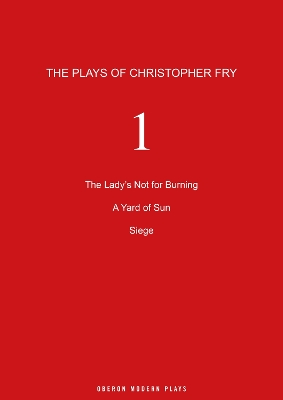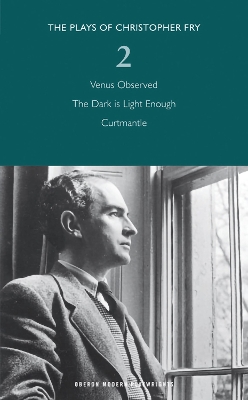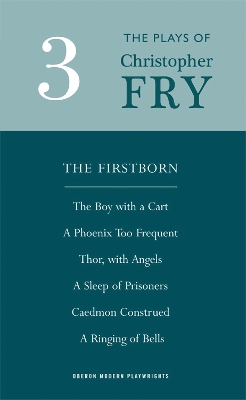Oberon Modern Playwrights
3 total works
Includes the plays The Lady's Not for Burning, A Yard of Sun and Siege
In this volume of Christopher Fry's original stage work, his most famous play The Lady's Not for Burning - 'Spring' in his set of 'Seasonal Plays' - is joined by the 'Summer' play A Yard of Sun, written in the mid-1930's.
Celebrated for the sensuousness and joyous wit of its language, The Lady's Not for Burning is a key play in the revival of verse drama in the 1940's, and the scale of its success made Fry one of the most famous playwrights of his day.
A Yard of Sun, Fry's last full-length stage play, is set in Siena just after the end of World War Two. Without ignoring the struggles and privations of war, the play is funny, touching and ultimately optimistic.
Based on the medieval story of Aucassin and Nicolette and conceived as a form of 'pageant', Siege with its mixing of verse and prose, sprawling structure, employment of different speech patterns and deliberately contemporary touches, gives a unique insight into Fry's development as a stage-craftsman.
In this volume of Christopher Fry's original stage work, his most famous play The Lady's Not for Burning - 'Spring' in his set of 'Seasonal Plays' - is joined by the 'Summer' play A Yard of Sun, written in the mid-1930's.
Celebrated for the sensuousness and joyous wit of its language, The Lady's Not for Burning is a key play in the revival of verse drama in the 1940's, and the scale of its success made Fry one of the most famous playwrights of his day.
A Yard of Sun, Fry's last full-length stage play, is set in Siena just after the end of World War Two. Without ignoring the struggles and privations of war, the play is funny, touching and ultimately optimistic.
Based on the medieval story of Aucassin and Nicolette and conceived as a form of 'pageant', Siege with its mixing of verse and prose, sprawling structure, employment of different speech patterns and deliberately contemporary touches, gives a unique insight into Fry's development as a stage-craftsman.
Includes the plays Venus Observed, The Dark is Light Enough and Curtmantle
This volume of Christopher Fry's original stage work concludes his 'Season Plays' with Venus Observed ('Autumn') and The Dark is Light Enough ('Winter').
In the first of these, commissioned by Laurence Olivier, a confident but ageing duke asks his grown-up son to choose a new wife for him. Written with a superbly light touch, this is a surprisingly reflective play about love, power and forgiveness.
The Dark is Light Enough, set during Hungary's revolt against Austria in the 1850s, concerns an imperious, inscrutable aristocrat who seems prepared to sacrifice family and household for the sake of her daughter's scapegrace ex-husband.
Also included is Fry's biographical play about King henry II, Curtmantle. Working with the 'epic' theatrical style of the time and utilising a new, leaner verse language, Fry captures Henry's energy, quick wit and quick temper, his relationship with Thomas Becket - Chancellor and friend, Archbishop and enemy - and his ultimately tragic struggles with his four ambitious sons.
This volume of Christopher Fry's original stage work concludes his 'Season Plays' with Venus Observed ('Autumn') and The Dark is Light Enough ('Winter').
In the first of these, commissioned by Laurence Olivier, a confident but ageing duke asks his grown-up son to choose a new wife for him. Written with a superbly light touch, this is a surprisingly reflective play about love, power and forgiveness.
The Dark is Light Enough, set during Hungary's revolt against Austria in the 1850s, concerns an imperious, inscrutable aristocrat who seems prepared to sacrifice family and household for the sake of her daughter's scapegrace ex-husband.
Also included is Fry's biographical play about King henry II, Curtmantle. Working with the 'epic' theatrical style of the time and utilising a new, leaner verse language, Fry captures Henry's energy, quick wit and quick temper, his relationship with Thomas Becket - Chancellor and friend, Archbishop and enemy - and his ultimately tragic struggles with his four ambitious sons.
Includes the playsThe Firstborn, A Phoenix Too Frequent, A Sleep of Prisoners, Thor, With Angels, The Boy With a Cart, Caedmon Construed and A Ringing of Bells
The third volume of Christopher Fry's original stage work brings together his only fully-fledged tragedy - The Firstborn, a vivid, urgent retelling of the Biblical story of Moses and the plagues of Egypt - and his six one-act plays, each revealing Fry's unique blend of humour and humanity. They include A Phoenix Too Frequent, a lively romance set in a Roman tomb, which first gave theatregoers notice of Fry's bravura talents as a verse dramatist; the meditative, resonant A Sleep of Prisoners, which links the Biblically-inspired dreams of four British POWs during World War Two; the Dark Age fable Thor, with Angels, with its characteristic themes of love and sacrifice; and two portraits of Anglo-Saxon churchmen, The Boy with a Cart and Caedmon Construed (also known as One Thing More), written fifty years apart. The collection concludes with Fry’s brief ‘conversational fantasy’ A Ringing of Bells, set on the eve of the millennium and written for his old school, Bedford Modern.
The third volume of Christopher Fry's original stage work brings together his only fully-fledged tragedy - The Firstborn, a vivid, urgent retelling of the Biblical story of Moses and the plagues of Egypt - and his six one-act plays, each revealing Fry's unique blend of humour and humanity. They include A Phoenix Too Frequent, a lively romance set in a Roman tomb, which first gave theatregoers notice of Fry's bravura talents as a verse dramatist; the meditative, resonant A Sleep of Prisoners, which links the Biblically-inspired dreams of four British POWs during World War Two; the Dark Age fable Thor, with Angels, with its characteristic themes of love and sacrifice; and two portraits of Anglo-Saxon churchmen, The Boy with a Cart and Caedmon Construed (also known as One Thing More), written fifty years apart. The collection concludes with Fry’s brief ‘conversational fantasy’ A Ringing of Bells, set on the eve of the millennium and written for his old school, Bedford Modern.


